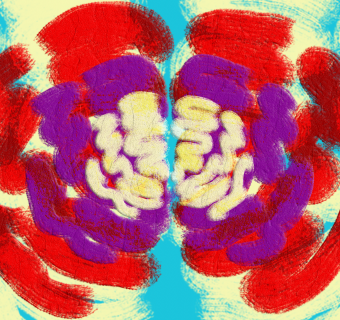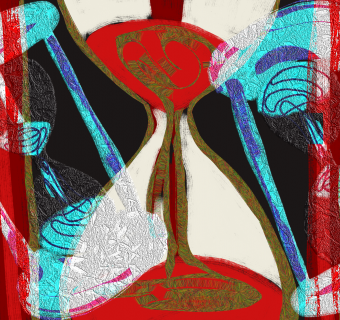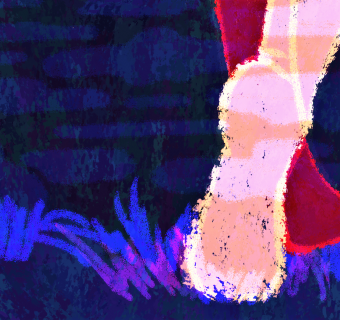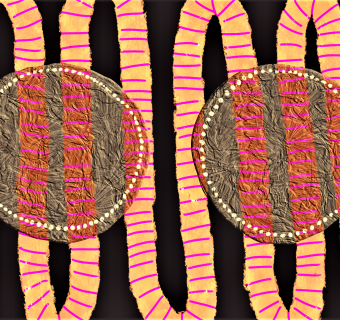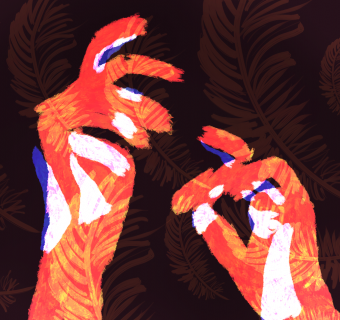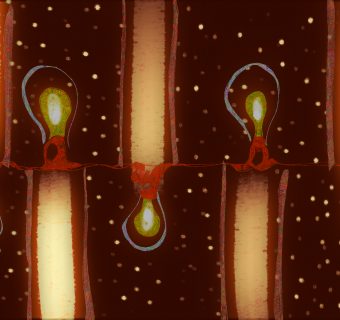A deep pit in my stomach. I checked the time on my phone every fifteen seconds, waiting for the perfect time. The perfect time to ignore down the rapid beating of my heart and the sweat that began to form under my arms; the perfect time to decide, “fight or flight?”. I picked “fight” every time, because I had no other choice.
I convinced myself I had no other choice.
I latched on to safe spaces, safe people, and mindlessly listened to and participated in conversations, while inside my brain, my body was running itself into overdrive. My hands shaking and my feet nervously shifting over and over, on repeat, until the perfect time came. I grasped the remaining semblances of control as I fortified myself to face the mouth of the dragon. One more check of the clock on my phone revealed the perfect time, the perfect time, the perfect time. I reasoned with myself that at this perfect time I would grin and bear it because at the this perfect time nothing would go wrong and I would win the fight. Every single thing inside me screamed with grit and grinding gears that I should not and would not proceed.
Rationality won the war. Deep breaths, and I walked from my locker into fifth period precalc and trig class.
If you had asked me in high school what my physical anxiety symptoms were, I could have told you in two seconds. They had been there my whole life, little friends reminding me every time I had to walk into a room full of quasi-strangers that they wanted me to feel like this was a life-threatening, deadly situation. But I had them figured out. When my stomach dropped to the floor, my heart started racing, and my armpits pooled sweat, I knew that I was anxious. Randomly, suddenly, confusingly, the symptoms of my anxiety evolved to suffering months on end: feeling extremely shaky and almost faint, unable to eat (and everything I did choke down tasted like sandpaper), with an urgent need to make myself throw up. These new symptoms happened the summer before I began my first year here at UVA--a perverse perfect timing that I would have to grapple with entirely new physical experiences in a foreign environment filled with stressors.
Today, my symptoms have evolved into an amalgamation of the two very different phases. Some days I feel like my heart is going to physically jump out of my chest if it beats any harder while I’m speaking in class. Some nights I wake up in darkness sick to my stomach and have to fight the feeling that tells me if I make myself throw up then I’ll feel better. I clench my jaw until I give myself a headache.
Anxiety can be confusing. Transitions can be confusing.
Transitions can also be productive.
I have consciously created many transitions in relation to my anxiety. We can be at the mercy of the physical manifestation of our thoughts sometimes (those little friends lying in wait), but we can also rework our thoughts and train our brains. As I said, I thought I didn’t have any other choice but to brace myself to the overwhelming experiences of an anxiety disorder. But I didn’t, and I don’t.
My newer anxiety symptoms have taken a little longer for me to understand. We are at a standoff--I’m learning to accept them as they are, and they are learning to be gentler with me.
I used to sneak around my anxiety, not telling anyone, thinking I was weird for having these thoughts and feelings, and avoiding any confrontation that would actually lead to a greater understanding of myself and my mental health. By addressing the actual thoughts and feelings that lead to such physical symptoms, like brainstorming positive affirmations or talking myself through a stressor in a rational way, I am now able to understand on a deeper level how to act, rather than just how to cope.
I find comfort in my old anxiety symptoms. And you might think I’m crazy to feel that way. What could possibly be comforting about that? For me, those symptoms and my coping mechanisms (like obsessions over the “perfect” time) started at such an early age that they were automatic, and I felt capable in handling them. And I didn’t really have to put much conscious effort into changing my thoughts because I was unaware that I even could treat anxiety in that way.
My newer anxiety symptoms have taken a little longer for me to understand. We are at a standoff--I’m learning to accept them as they are and they are learning to be gentler with me. If I’m feeling muscle tension, a breathing exercise usually works for me. If my heart is beating loud, I’ll put my hand over it in solace. And then I have to treat them beyond their physicality, into their roots in my thoughts and behaviors.
For a long, long time I thought my anxiety made me weird. I would sit and explain my anxious thoughts and feelings and natural coping mechanisms and call them weird. Finally, my therapist pointed it out. I was assigning a negative label to things that are so intrinsic to my experiences that I cannot remember a time without them. I was letting guilt and shame and pain rule my impression of myself. Something that has served as an amazing tool for me is the ability to recognize when I’m feeling anxious and assign my cognitions to a cause. Doing so allows me to stop and approach my thoughts and feelings rationally and with self-love (rather than criticism or disappointment).
When I look back now at the anxious me from high-school days, I want to wrap that girl up in my arms and give her the care that I give myself now when it comes to mental health. I want to urge her to let it out. I want to teach her about self-advocacy and about being honest and frank and addressing problems head on. And I want her to understand that even today, our journey isn’t over. It scares me to think that anxiety will be something that continues throughout my life. It scares me to think that my new physical symptoms of my anxiety could occur at any day over such a long period of life and that new stressors come with new experiences. So I’m trying to transition those fears and those anxieties into excitement. When I feel a fast-paced panic, I do have a choice--I can slow myself down and come to understand myself as I function with anxiety. Sometimes just being in the present moment is the “perfect” time. Being here and now, using the tools I’ve learned in the moment, is as perfect as its gets.



